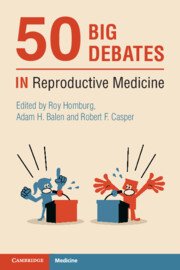Book contents
- 50 Big Debates in Reproductive Medicine
- Series page
- 50 Big Debates in Reproductive Medicine
- Copyright page
- Contents
- Contributors
- Foreword
- Introduction
- Section I Limits for IVF
- Section II IVF Add-ons
- Section III The Best Policy
- Section IV Embryology
- Section V Ethics and Statistics
- Section VI Male-factor Infertility
- Section VII Genetics
- Section VIII Ovarian Stimulation
- 41A AMH Is a Better Predictor of Ovarian Response Than AFC
- 41B AMH Is a Better Predictor of Ovarian Response Than AFC
- 42A Pituitary Suppression Using GnRH Agonist for IVF Is Outdated
- 42B Pituitary Suppression Using GnRH Agonist for IVF Is Outdated
- 43A The Maximum Effective Dose of FSH for Ovarian Stimulation in IVF Is 300 IU
- 43B The Maximum Effective Dose of FSH for Ovarian Stimulation in IVF Is 300 IU
- 44A There Is No Place for Natural and Mild Stimulation IVF
- 44B There Is No Place for Natural and Mild Stimulation IVF
- Section IX Hormones and the Environment
- Index
- References
43A - The Maximum Effective Dose of FSH for Ovarian Stimulation in IVF Is 300 IU
For
from Section VIII - Ovarian Stimulation
Published online by Cambridge University Press: 25 November 2021
- 50 Big Debates in Reproductive Medicine
- Series page
- 50 Big Debates in Reproductive Medicine
- Copyright page
- Contents
- Contributors
- Foreword
- Introduction
- Section I Limits for IVF
- Section II IVF Add-ons
- Section III The Best Policy
- Section IV Embryology
- Section V Ethics and Statistics
- Section VI Male-factor Infertility
- Section VII Genetics
- Section VIII Ovarian Stimulation
- 41A AMH Is a Better Predictor of Ovarian Response Than AFC
- 41B AMH Is a Better Predictor of Ovarian Response Than AFC
- 42A Pituitary Suppression Using GnRH Agonist for IVF Is Outdated
- 42B Pituitary Suppression Using GnRH Agonist for IVF Is Outdated
- 43A The Maximum Effective Dose of FSH for Ovarian Stimulation in IVF Is 300 IU
- 43B The Maximum Effective Dose of FSH for Ovarian Stimulation in IVF Is 300 IU
- 44A There Is No Place for Natural and Mild Stimulation IVF
- 44B There Is No Place for Natural and Mild Stimulation IVF
- Section IX Hormones and the Environment
- Index
- References
Summary
The objective of ovarian stimulation in an IVF cycle is the production of between 5 and 15 oocytes, avoiding both a poor and a hyper-response which are generally associated with worse outcomes for the patient. In women predicted to have a low response, it has become common practice to increase the daily FSH dose to 300 IU or above, in order to increase the oocyte yield, and achieve a normal response. While evidence from randomised trials demonstrates that higher doses tend to result in fewer cycle cancellations and a higher oocyte yield, there is no evidence that these effects translate to an improvement in the pregnancy and live birth rates. Given that increased FSH dosing is associated with higher costs, increasing the dose beyond 300 IU is not recommended.
- Type
- Chapter
- Information
- 50 Big Debates in Reproductive Medicine , pp. 222 - 224Publisher: Cambridge University PressPrint publication year: 2021



